On Thursday, BofA Securities revised its stance on Electronic Arts (NASDAQ:EA) shares, downgrading the video game company's stock rating from Buy to Neutral and significantly reducing the price target from $170.00 to $130.00. According to InvestingPro data, EA currently trades at a P/E ratio of 36.5x and maintains strong financial health with an overall score of "GOOD." The adjustment comes as the firm's analyst expressed concerns over Electronic Arts' ability to capture a sufficient share of player engagement and spending to generate substantial growth within the challenging PC and console game industry.
The analyst, Omar Dessouky, indicated that the majority of the projected $350-450 million decrease in Live Services bookings was attributable to Global Football. This suggests a potential double-digit year-over-year fall in the recent quarter and anticipates a continuation of this trend in the upcoming quarter. InvestingPro data reveals that EA's revenue declined by 2.4% in the last twelve months, though the company maintains robust profitability with a gross margin of 78.6%. The reasons for this downturn remain uncertain, with possibilities ranging from execution missteps to seasonal variations, or even structural issues such as a saturated player market.
Dessouky's analysis casts doubt on the potential for Electronic Arts to achieve sustainable growth and margin expansion without the strong performance of its football games, particularly noting that Global Football contributes approximately 60% of the company's operating income. Ultimate Team, identified as one of EA's highest-margin offerings, is heavily reliant on the performance of the football segment.
The downgrade reflects a shift in confidence regarding Electronic Arts' future prospects in an industry that is expected to grow at a compound annual growth rate (CAGR) of around 4%. The company's reliance on the Global Football franchise as a primary growth driver is now seen as a vulnerability, especially if the decline in player engagement persists.
The lowered price target and rating change are likely to influence investor sentiment as they reassess the value and potential of Electronic Arts in light of these new projections. The market will be watching closely for Electronic Arts' next moves to counterbalance the challenges identified by BofA Securities. With EA's next earnings report due on February 4th, investors seeking deeper insights can access comprehensive analysis and additional ProTips through InvestingPro, which offers detailed valuation metrics and financial health indicators for informed decision-making.
In other recent news, Electronic Arts (EA) has seen a revision in its stock ratings by various financial firms. BMO (TSX:BMO) Capital downgraded EA's stock rating to Market Perform and reduced the target price to $145, following a shortfall in Bookings. The company cited challenges with EA Sports FC25 and Dragon Age: The Veilguard as primary factors. EA also revised its fiscal outlook, anticipating a mid-single-digit decline in live services net bookings and net bookings of approximately $2.215 billion for the third fiscal quarter.
Oppenheimer maintained an Outperform rating on EA's stock but reduced the price target to $165, while Stifel reduced its price target for EA to $159 and maintained a Hold rating. Benchmark analysts, however, kept a Buy rating with a $163 price target. These adjustments come in light of recent developments, including decreased player engagement and modest sales of Dragon Age.
Analysts' projections for EA's growth in fiscal year 2026 have become more variable due to the uncertain release date of Grand Theft Auto 6. EA will provide detailed financial results for the third fiscal quarter on February 4, 2025. These recent developments highlight the dynamic nature of EA's financial performance and the ongoing analysis by market experts.
This article was generated with the support of AI and reviewed by an editor. For more information see our T&C.
